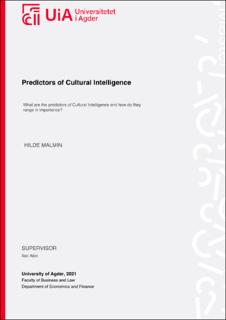| dc.contributor.author | Malmin, Hilde | |
| dc.date.accessioned | 2021-09-30T08:52:02Z | |
| dc.date.available | 2021-09-30T08:52:02Z | |
| dc.date.issued | 2021 | |
| dc.identifier.citation | Malmin, H. (2021) Predictors of Cultural Intelligence : What are the predictors of Cultural Intelligence and how do they range in importance? (Master's thesis). University of Agder, Kristiansand. | en_US |
| dc.identifier.uri | https://hdl.handle.net/11250/2786491 | |
| dc.description | Master's thesis in Business administration (BE501) | en_US |
| dc.description.abstract | Knowledge about which factors, like personality traits, experiences and demography, and how these relate to cultural intelligence (CQ) is important in today’s business world as we see trends of increasing globalization and cross-border communication and collaboration. Awareness of CQ has shown to be of high significance as it favors efficient adaptation and good communication skills in an intercultural setting, which can lead to; higher chances of completing international expatriate assignments successfully, more effective international negotiations, merging efficient and successful teams and produce better quality work. Naturally, businesses wish to employ people with high CQ. But how do you as a recruiter know what characteristics predicts positive CQ, and which characteristics the focus should be direct at to increase the chances of choosing the person with the most favorable combination of CQ traits? Keywords: cultural intelligence(CQ); CQ predictors; ranking of CQ traits; cross-cultural management; virtual teams; DataRobot; artificial intelligence | en_US |
| dc.language.iso | eng | en_US |
| dc.publisher | University of Agder | en_US |
| dc.rights | Attribution-NonCommercial-NoDerivatives 4.0 Internasjonal | * |
| dc.rights.uri | http://creativecommons.org/licenses/by-nc-nd/4.0/deed.no | * |
| dc.subject | BE501 | en_US |
| dc.title | Predictors of Cultural Intelligence : What are the predictors of Cultural Intelligence and how do they range in importance? | en_US |
| dc.type | Master thesis | en_US |
| dc.rights.holder | © 2021 Hilde Malmin | en_US |
| dc.subject.nsi | VDP::Samfunnsvitenskap: 200::Sosiologi: 220 | en_US |
| dc.subject.nsi | VDP::Samfunnsvitenskap: 200::Statsvitenskap og organisasjonsteori: 240::Offentlig og privat administrasjon: 242 | en_US |
| dc.source.pagenumber | 113 | en_US |

